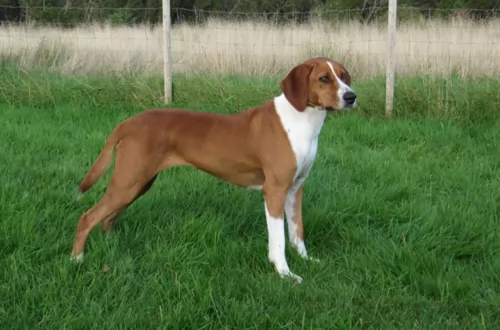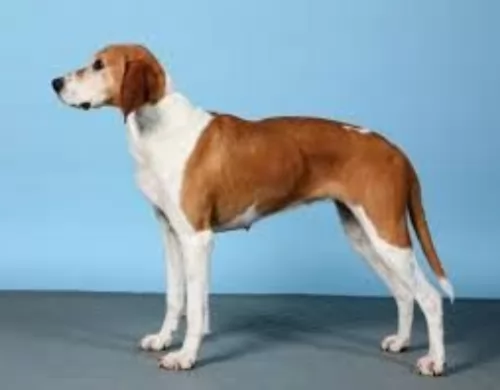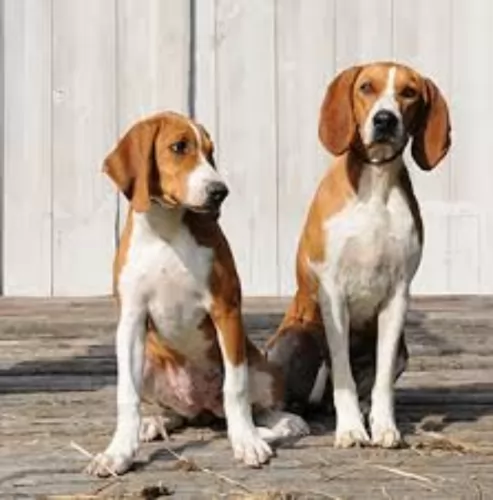 Petzlover
Petzlover Hygenhund is originated from Norway but Welsh Corgi is originated from United Kingdom. Hygenhund may grow 31 cm / 13 inches higher than Welsh Corgi. Hygenhund may weigh 10 kg / 23 pounds more than Welsh Corgi. Both Hygenhund and Welsh Corgi has almost same life span. Both Hygenhund and Welsh Corgi has same litter size. Hygenhund requires Moderate Maintenance. But Welsh Corgi requires High Maintenance
Hygenhund is originated from Norway but Welsh Corgi is originated from United Kingdom. Hygenhund may grow 31 cm / 13 inches higher than Welsh Corgi. Hygenhund may weigh 10 kg / 23 pounds more than Welsh Corgi. Both Hygenhund and Welsh Corgi has almost same life span. Both Hygenhund and Welsh Corgi has same litter size. Hygenhund requires Moderate Maintenance. But Welsh Corgi requires High Maintenance
 The Hygenhund is a hound from Norway that was developed in the early 1800’s by the Norwegian breeder Hygen. It was developed for hunting small game such as fox, rabbit, hare or racoon. It is known for its endurance and ability to survive travel across vast artic land without fatigue. It was developed by crossing several Norwegian hounds with ones from England and Germany. This includes basset hounds, holsteiner hounds, beagles, Bloodhounds, Scandinavian hounds and English Pointers. The resulting Hygehound is a scent hound whose popularity fell in the 20th century. Most of the remaining dogs today are located in Norway. The Norwegian Kennel Club and the UKC have both recognized the breed yet its numbers remain low. Even at that the breed today remains a great hunting dog but it is also a great companion or family dog.
The Hygenhund is a hound from Norway that was developed in the early 1800’s by the Norwegian breeder Hygen. It was developed for hunting small game such as fox, rabbit, hare or racoon. It is known for its endurance and ability to survive travel across vast artic land without fatigue. It was developed by crossing several Norwegian hounds with ones from England and Germany. This includes basset hounds, holsteiner hounds, beagles, Bloodhounds, Scandinavian hounds and English Pointers. The resulting Hygehound is a scent hound whose popularity fell in the 20th century. Most of the remaining dogs today are located in Norway. The Norwegian Kennel Club and the UKC have both recognized the breed yet its numbers remain low. Even at that the breed today remains a great hunting dog but it is also a great companion or family dog.
 The Pembroke Welsh Corgi and the Cardigan Welsh Corgi were once considered to be two types of the same breed. Today they are recognized as very different breeds, but cousins of sorts.. They are alike in many ways and very different in others. The general information in terms of height and weight above applies to the more popular and better known Pembroke Welsh Corgi, developed as a herding dog from the spitz line in Pembroke shire, Wales. The Pembroke is famous for being the breed favored since childhood by Queen Elizabeth, the current queen of England. It’s believed that the Pembroke came to the country around the 10th century with Flemish weavers. The Cardigan is thought to have come with the Norse people and be a relative of the Sedish Vallhund.
The Pembroke Welsh Corgi and the Cardigan Welsh Corgi were once considered to be two types of the same breed. Today they are recognized as very different breeds, but cousins of sorts.. They are alike in many ways and very different in others. The general information in terms of height and weight above applies to the more popular and better known Pembroke Welsh Corgi, developed as a herding dog from the spitz line in Pembroke shire, Wales. The Pembroke is famous for being the breed favored since childhood by Queen Elizabeth, the current queen of England. It’s believed that the Pembroke came to the country around the 10th century with Flemish weavers. The Cardigan is thought to have come with the Norse people and be a relative of the Sedish Vallhund.
The Cardigan Welsh Corgi, also a herding dog has their ancestry in ancient Celtic dogs. They are older than the Pembroke and hail from Cardiganshire, Wales.
Both breeds are friendly, smart and independent. Both dogs herd cattle and sheep. About the end of the 19th century, farmers in Cardiganshire began to raising sheep rather than cattle. The corgis were herding dogs for cattle. “Heelers” who avoid the cattle kicking them by nipping at the cattle’s heel. Pembrokeshore and Cardiganshire are counties in South West Wales that adjoin each other.
Then the move was made from cattle to sheep in Cardiganshire they bred their corgis with the Welsh Sheepdog where the merle color is said to come from, and the Pembroke Welsh Corgi. This caused the similarities between the two dwarf breeds. At the same time the distance grew between the two breeds and they grew into very distinct and different looking dogs. There are also some differences in their personalities.
The first corgi to appear at Crufts came in 1927 and in 1928 a Pembroke won a championship at Cardiff for the first ever corgi win. It was not until 1934 that the kennel club recognized them as separate breeds rather than a Pembroke shire type and a Cardiganshire type. From this point on the two are separate breeds with tremendous similarities. A Pem won the Reserve Best in Show at Crufts in 1955.
The first corgi came to the United States in 1933 by a breeder of Old English Sheepdogs. In 1934 the American Kennel Club (AKC) recognized Corgis as one breed with 2 types. The Pembroke has always been the more popular of the two.
 The Hygenhund has a solid rectangular and compact body with muscular and compact legs and paws. Their heads are shaped like a triangle with dark eyes and a broad skull. The muzzle and neck are long and the topline is even. They carry their tail high, but they do not curl it over their back. They are a medium sized dog with short hair. They have an overabundance of energy and get bored easily. They can come in black with chestnut or white markings, yellow and red, chestnut without or with black markings.
The Hygenhund has a solid rectangular and compact body with muscular and compact legs and paws. Their heads are shaped like a triangle with dark eyes and a broad skull. The muzzle and neck are long and the topline is even. They carry their tail high, but they do not curl it over their back. They are a medium sized dog with short hair. They have an overabundance of energy and get bored easily. They can come in black with chestnut or white markings, yellow and red, chestnut without or with black markings.
 They used to differentiate between the Cardigan and the Pembroke by saying the Cardigan was the one with the bigger ears and the Pembroke had no tail. In many parts of the world where tail docking has been banned, most Pembrokes now have tails. Only those born without don’t have them. Both dogs are long and low to the ground with big chests and short legs. This is because they are dwarfs. They are not little dogs.
They used to differentiate between the Cardigan and the Pembroke by saying the Cardigan was the one with the bigger ears and the Pembroke had no tail. In many parts of the world where tail docking has been banned, most Pembrokes now have tails. Only those born without don’t have them. Both dogs are long and low to the ground with big chests and short legs. This is because they are dwarfs. They are not little dogs.
The Cardigan Welsh Corgi is heavier boned than the Pembroke, has large rounded ears and a flowing, fox like tail. The Cardigan comes in a variety of colors but never predominately white. He is double coated with a dense, harsh outer and a soft, short and thick undercoat.
Pembroke is smaller and longer than the Cardigan with pointed ears. They are intelligent, sturdy and strong with tremendous stamina. The tail is docked in the United States or the pups are bred not to have a tail. This was originally so that the cattle could not step on their tails and injure the dogs. The double coat on the Pembroke is short and weather resistant inner coat with a longer and rougher outercoat. He has the same deep dropped chest as the Cardigan. Both corgis shed voraciously.
 1. Children friendliness – The Hygenhund is very friendly to children and love to play with them.
1. Children friendliness – The Hygenhund is very friendly to children and love to play with them.
Stamina, intelligence and ability to endure cold climates.
Very adaptable in some ways – enduring cold climates for instance. However, they need a large yard or area to run in. They are not as adaptable in an apartment.
The Hygenhund is very intelligent and a quick learner. They love learning new things.
 1Children friendliness For the most part they are good but can be grumpy and bossy. They are bossy personalities
1Children friendliness For the most part they are good but can be grumpy and bossy. They are bossy personalities
3.Adaptability – Very. Can live anywhere but they do need to run and they bark a lot.
4.Learning ability – incredibly smart but stubborn. Respond well to training that is reward based.
 • Degenerative Myelopathy – a muscular neurological disease very similar to Lou Gehrig’s Disease or ALS. It is always fatal.
• Degenerative Myelopathy – a muscular neurological disease very similar to Lou Gehrig’s Disease or ALS. It is always fatal.
• Some have cardiac issues while others may have hip dysplasia or Von Willebrand’s disease.
 Since the Hygenhund is such a high energy working dog feed a high quality food. Feed 3-4 times a day for a total of 2.3 cups.
Since the Hygenhund is such a high energy working dog feed a high quality food. Feed 3-4 times a day for a total of 2.3 cups.
Again this is a high energy dog. Feed a high protein good quality dog food twice a day for a total of 3-4 cups.
Good speed and stamina. Good in cold climates.
The Hygenhund needs plenty of exercise to dissipate all its working energy. They will excel at field trials, lure coursing, fly ball, tracking, and agility.
 1Feeding the puppy prone to overweight, the pem needs ½ to 1 cup of small breed high quality food in 3-4 meals per day. The Cardigan needs ¾ to 1 ¼ cups of high quality small breed food in 3-4 meals per day.
1Feeding the puppy prone to overweight, the pem needs ½ to 1 cup of small breed high quality food in 3-4 meals per day. The Cardigan needs ¾ to 1 ¼ cups of high quality small breed food in 3-4 meals per day.
2.Feeding the adult – Don’t overfeed them. The Pem need 1 cup per day of high quality small breed food in 2 meals per day. The Cardigan needs 1-1 ½ cups per day in one to two meals.
They are fast, athletic dogs. Agility, CAT, Barnhunt. Herding trials, flyball and they just love backyard ball fetching. Confirmation and obedience, along with rally.